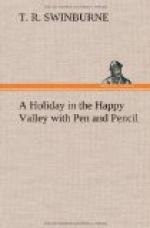Down the gentle river we swiftly glided all day, while the Takht and Hari Parbat grew smaller and bluer, and Srinagar lay below them invisible in its swathing greenery.
Reaching Sumbal at sunset, we turned to the left down a narrow canal, and soon the Wular lay—a sheet of molten gold—upon our right; and by the time we had moored alongside a low strip of reedy bank, the glorious rosy lights had faded from the snows of the Pir Panjal, and their royal purple and gold had turned to soft ebony against the primrose of the sky.
A few hungry mosquitoes worried us somewhat before sunset, promising worse to follow; but the sharp little breeze that came flickering over the Wular after dark seemed to upset their plans, and send them shivering and hungry to shelter among the reeds and rushes.
This morning we crossed the Wular, starting as the first pale dawn showed over the eastern hills.
Before the sun rose over Apharwat, his shafts struck the higher snows and turned them rosy; while the lower slopes, their distant pines suffused with strong purple, stood reflected in the placid mirror of the lake.
“Full many a glorious morning have
I seen
Flatter the mountain tops with sovran
eye,”
but seldom a more lovely one than this—our last on the Wular Lake.
The active figures of the propellent Mangis, and the quiet ones of their ladies at the helm, completed a picture to be recalled with a sigh when we are parted by thousands of miles from this entrancing valley.
Sopor we had understood to be but an uninteresting place, but we were, perhaps, inclined to regard things Kashmirian through somewhat rosy spectacles. Anyhow, we rather liked Sopor. Mooring close alongside a remarkably picturesque building standing in the midst of a smooth green lawn, which was once, I believe, a dak bungalow, we halted to make arrangements for the hire of coolies and ponies to take us inland, and I went off to the post-office for letters and to make inquiries as to the probable depth of water in the river Pohru.
Our skipper, Juma, affirmed that there was no water to speak of; but Juma probably—nay, certainly—prefers the otium of a sojourn at Sopor to the toil of punting up the Pohru.
The postmaster declared that there was lots of water, but qualified his optimism by saying that it was falling fast. So we arranged for our land transport of ponies for ourselves, and a dandy for Hesketh, to meet us one march up the river at Nopura, while we ourselves set forward in our boats to Dubgam, three or four miles down the Jhelum, where the Pohru joins it. At the entrance are large stores of timber, principally deodar, which is floated down from the Lolab, stored at Dubgam, and sent thence down country and otherwhere for sale. The great boom across the river to catch the floating logs had been carried away in the flood, and merely showed a few melancholy and ineffectual spikes of wood sticking up above the now calm and sluggish river.




